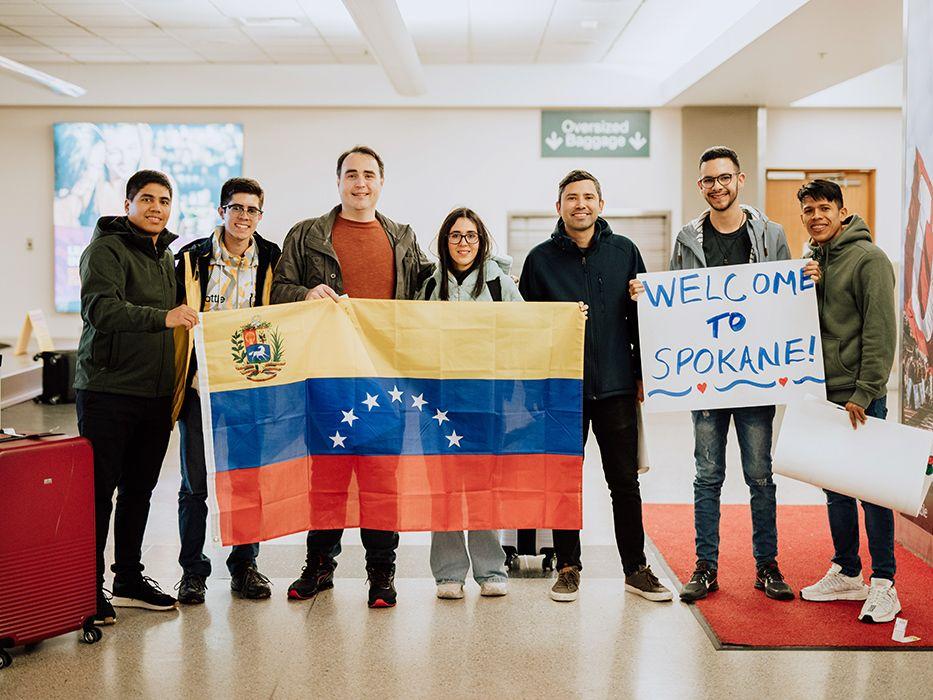Sign up for updates about Welcome.US, policy changes impacting newcomers, and how you can get involved.
Sponsor Latin Americans
Through the Processes for Cubans, Haitians, Nicaraguans, and Venezuelans, American sponsors provided safety and community to newcomers fleeing violence and persecution.


Alert
On March 21, the U.S. government announced that it will terminate existing humanitarian parole status for CHNV newcomers.
Latest updates
What impact will policy changes have on newcomers, refugees, and sponsorship programs? Check out our latest explainers to learn more.
Sponsorship FAQs
What’s the latest on CHNV?
As of Jan. 20, 2025, DHS ended the Processes for Cubans, Haitians, Nicaraguans, and Venezuelans (CHNV) program. The program is not accepting new applications, pending applications will not be processed, and no new travel authorizations will be issued.
DHS announced that it will terminate the humanitarian parole status for individuals who arrived in the United States through the CHNV sponsorship program. Termination of parole will take effect on April 24, 2025. If an individual's parole was set to expire earlier, termination would occur on the expiration date. DHS intends to prioritize removing individuals from the U.S. who haven’t applied for another status, like TPS or asylum, by March 25, 2025. View our CHNV policy explainer page for more information and resources.
Sponsors can consult our guide to alternative legal options for humanitarian parolees to seek professional legal counsel.
What happens to my pending application or approved sponsorship if the newcomer hasn’t arrived yet?
With the pause of the U4U program and the end of the CHNV program, pending applications or approved sponsorships for newcomers that have not arrived will not be processed.
The programs are not accepting new applications, pending applications will not be processed, and no new travel authorizations are being issued. We are closely monitoring official updates and will share further information as it becomes available.
If you have questions about a specific case, you can ask your congressional representatives to follow up directly with USCIS on your behalf. Use our guide for information on how.
If no immigration applications are being processed for individuals with humanitarian parole, why recommend those individuals to apply for TPS, asylum, EADs, etc.?
On Feb. 14, media reports indicated that DHS issued an internal memo suspending decision making on all immigration applications filed by individuals who arrived in the U.S. through the U4U and CHNV parole programs. This indicates that DHS will not approve any alternative forms of legal status (including Temporary Protected Status (TPS) and asylum) many sponsored individuals are seeking while this pause is in place.
However, we still strongly recommend that all individuals with a primary status of humanitarian parole seek advice from an immigration attorney immediately to determine if viable alternative statuses remain an option for them. Check out our guide to alternative legal options for support.
How does the pending lawsuit related to the termination of parole affect the CHNV or U4U newcomer I sponsored?
We are tracking the lawsuit, Doe v. Noem, that challenged the U.S. government’s actions to end humanitarian parole processes including CHNV and U4U. We will provide updates once a final order is made. For more up-to-date information, you can follow the case here.
How will CHNV newcomers know if their parole status has been terminated?
The March 25 public notice serves as notice of the termination of parole status for those who arrived through CHNV and if their primary status is humanitarian parole. DHS will also provide individual notice to each parolee through their USCIS online account.
Individuals who arrived in the U.S. through CHNV may still receive an individual notice via email even if they have applied for or received an alternative status. Receiving an individual notice does not indicate that the recipient is a priority for removal. Please consult legal counsel to understand options.
How will CHNV newcomers know if they can stay in the U.S.?
All individuals who arrived in the U.S. through CHNV should seek advice from an immigration attorney immediately to determine if they already have alternative status or, if not, what viable options remain for them. Find an immigration attorney through the American Immigration Lawyers Association search tool.
How does the termination of parole status for CHNV beneficiaries affect their employment authorization?
If an individual who arrived in the U.S. through CHNV currently has employment authorization that was based on their parole status, their employment authorization will automatically terminate when their parole status terminates (on April 24, 2025 or sooner if their status expires before then). If the individual has been granted employment authorization through an alternative legal status (e.g., asylum or TPS), their employment authorization will not be impacted.
Stories of Welcome
Americans across 12,000 zip codes in all 50 states changed lives through sponsorship.



Stories of Welcome
Colombian refugees welcomed to a ‘beautiful city where we could live in peace’
April 12, 2024

